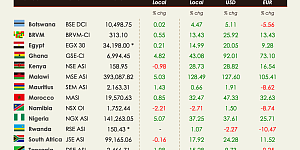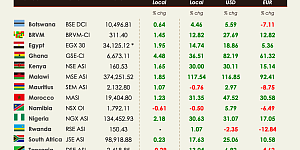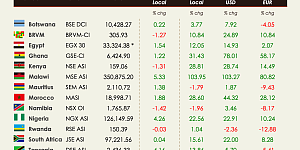Past behaviour is not always the best predictor of future behaviour as evidenced by Nigeria’s fall out of the top three best performer this week. Egypt is back in the top three supported by improving fundamentals while Ghana remains the best performer year-to-date.
South African prosecutors have decided to pursue a case against former President Zuma. Zuma will face trial on 16 charges among which graft and racketeering. This certainly looks good on Cyril Ramaphosa’s announced war against corruption although this has nothing to do with him being President. The prosecution is based on allegations that Zuma would have received 4.07 mn rand in bribes from arms dealers. The JSE lost 1.81%.
Ivory Coast hit a record this week with the biggest issuance in euro from an African government as it sold €1.7bn of bonds. Egypt, Nigeria, Kenya, Senegal and now Ivor Coast have all taped into international markets this year raising a total of $12.8 bn of Eurobonds. The BRVM benchmark index is up 2.4% in dollar terms in 2018 after two years of declines. IMF expects GDP growth to remain above 6% in the medium term in the West African Economic and Monetary Union, above the 3.4% expected for sub-Saharan Africa in 2018. The BRVM added 1.46%.
Moody’s reduced Tunisia’s long-term issuer credit rating by one notch to B2. Tunisia’s rating is now at par with Argentina, Nigeria, Cameroon and Kenya. The rating agency gave the country a “stable” outlook. The downgrade is based on the deteriorating fiscal situation and foreign exchange reserves. The country suffers from a high debt burden which has been increasing over the last couple of years. Inflation reached 7.1% boosted by the weaker currency, subsidy cuts and tax rises. As a result, the central bank increase rates by 75 basis points last week. On top of that, reforms have been slowed down by protests over austerity measures. Tunisia is not the sweet spot. The TUNINDEX added 1.80%.
IMF is giving Kenya additional time to finish mandatory reviews. Indeed, IMF approved Kenya’s request to extend by six months a stand-by loan that was due to expire at the end of March. An amendment of the bill currently capping commercial interest rates could happen soon since it was one of the condition IMF needed to approve the extension. Good news since the cap on commercial lending rates have not have the intended benefit of improving credit access. The NSE added 1.93%.
Inflation continues to slow in Nigeria with latest data published by the Statistics office showing annual inflation reaching 14.3% in February. Food price inflation has persisted in the high double digits over the last year. Nigeria is in the crop season and output is growing which is supporting lower food prices. The slowing inflation is paving the way for easier policy following over a year of maintaining interest rates at 14%. The NGSE shed 1.81%.










































